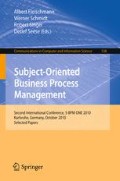Abstract
Traditional approaches for business process management assume that process models remain unchanged. However, businesses today have to adapt their business process models to new market changes instantaneously. Current methods for business process management approaches and their supporting information systems turn out to be too time-consuming and costly. This contribution suggests a new business process management concept (BPM 2.0) along with a corresponding software system that increase the flexibility of businesses by allowing employees to improve ”their” business processes. A case study at a large European construction firm critically examines the feasibility both of the concept as well as the software system.
Access this chapter
Tax calculation will be finalised at checkout
Purchases are for personal use only
Preview
Unable to display preview. Download preview PDF.
References
Kindermann, K.: Identifikation und Potenzialbeurteilung interner Business Services zur Service Externalisierung. Diploma Thesis. Friedrich-Alexander-Universität Erlangen-Ntürnberg, Ntürnberg (2010)
Davenport, T.H.: Process innovation. Reengineering work through information technology. Harvard Business School Press, Boston (1993)
Hammer, M., Champy, J.: Reengineering the corporation. A manifesto for business revolution. Harper Business, New York (1993)
Rummler, G.A., Brache, A.P.: Improving performance. How to manage the white space on the organization chart. Jossey-Bass, San Francisco (1995)
Johansson, H.J.: Business process reengineering. Breakpoint strategies for market dominance. Wiley, Chichester (1993)
Weske, M.: Business Process Management. Concepts, Languages, Architectures. Springer, Heidelberg (2007)
Wikipedia: Business process, http://en.wikipedia.org/wiki/Business_process (last checked: July 18, 2010)
Kurz, M.: BPM 2.0. Kollaborative Gestaltung von Geschäftsprozessen. In: Schumann, M., Kolbe, L.M., Breitner, M.H., Frerichs, A. (eds.) Multikonferenz Wirtschaftsinformatik 2010, pp. 729–740. Univ.-Verl. Göttingen, Göttingen (2010)
Schreyögg, G.: Organisation. Grundlagen moderner Organisationsgestaltung. Mit Fallstudien. Gabler, Wiesbaden (2008)
Crowther, D., Green, M.: Organisational theory. CIPD, London (2008)
Kieser, A., Ebers, M.: Organisationstheorien. Kohlhammer, Stuttgart (2006)
Taylor, F.W.: The principles of scientific management. Dover, Mineola (1998)
Schmidt, W., Fleischmann, A., Gilbert, O.: Subjektorientiertes Geschäftsprozessmanagement. HMD - Praxis der Wirtschaftsinformatik, 52–62 (2009)
Fleischmann, A.: What is S-BPM? Accepted. Communications in Computer and Information Science 85 (2010)
Berghaus, M., Luhmann, N.: Luhmann leicht gemacht. Eine Einführung in die Systemtheorie, Böhlau, Köln (2004)
Wikipedia Foundation: Niklas Luhmann, http://en.wikipedia.org/wiki/Niklas_Luhmann (last checked: July 27, 2010)
McAfee, A.P.: Enterprise 2.0. The Dawn of Emergent Collaboration. MIT Sloan Management Review 47, 20–28 (2006)
Kurz, M.: BPM 2.0. Organisation, Selbstorganisation und Kollaboration im Geschäftsprozessmanagement. Bamberg, Erlangen-Nürnberg, Regensburg (2009)
Billing, G., Kurz, M., Hettling, K., von Jouanne-Diedrich, H.: Applying BPM 2.0 in IT centric environments. Accepted paper. In: Hull, R., Mendling, J., Tai, S. (eds.) BPM 2010. LNCS, vol. 6336, Springer, Heidelberg (2010)
Stamer, S.: Enterprise 2.0. Learning by Doing. In: Buhse, W., Stamer, S. (eds.) Enterprise 2.0 - die Kunst, loszulassen, Rhombos, Berlin, pp. 59–87 (2008)
Cacaci, A.: Change Management. Widerstände gegen Wandel. Deutscher Universitäts-Verlag/ GWV Fachverlage GmbH Wiesbaden, Wiesbaden (2006)
Randolph, A.W.: Re-thinking Empowerment. Why Is It So Hard to Achieve? Organizational Dynamics 29, 94–107 (2000)
McAfee, A.: Eine Definition von Enterprise 2.0. In: Buhse, W., Stamer, S. (eds.) Enterprise 2.0 - die Kunst, loszulassen, Rhombos, Berlin, pp. 17–35 (2008)
Kotter, J.P., Schlesinger, L.A.: Choosing Strategies in Change. Harvard Business Review 86, 130–139 (2008)
Neuberger, O.: Mikropolitik und Moral in Organisationen. Herausforderung der Ordnung. Lucius & Lucius, Stuttgart (2006)
Picot, A., Reichwald, R., Wigand, R.T.: Die grenzenlose Unternehmung. Information, Organisation und Management. Gabler, Wiesbaden (2001)
Böhle, F., Bolte, A.: Die Entdeckung des Informellen. Der schwierige Umgang mit Kooperation im Arbeitsalltag. Campus-Verl, Frankfurt/Main (2002)
Hauschildt, J., Salomo, S.: Innovationsmanagement. Vahlen, München (2007)
Schmelzer, H.J., Sesselmann, W. (eds.): Geschäftsprozessmanagement in der Praxis. Kunden zufrieden stellen, Produktivität steigern, Wert erhöhen. Hanser, München (2008)
Reichwald, R., Möslein, K., Huff, A.S., Kölling, M., Neyer, A.-K.: Service Innovation, Leipzig (2008)
Davison, R.M., Martinsons, M.G., Kock, N.: Principles of Canonical Action Research. Information Systems Journal 14, 65–85 (2004)
Busemann, K., Gscheidle, C.: Web 2.0: Communitys bei jungen Nutzern beliebt. Ergebnisse der ARD/ZDF-Onlinestudie 2009. Media Perspektiven 7, 356–364 (2009)
Author information
Authors and Affiliations
Editor information
Editors and Affiliations
Rights and permissions
Copyright information
© 2011 Springer-Verlag Berlin Heidelberg
About this paper
Cite this paper
Kurz, M., Fleischmann, A. (2011). BPM 2.0: Business Process Management Meets Empowerment. In: Fleischmann, A., Schmidt, W., Singer, R., Seese, D. (eds) Subject-Oriented Business Process Management. S-BPM ONE 2010. Communications in Computer and Information Science, vol 138. Springer, Berlin, Heidelberg. https://doi.org/10.1007/978-3-642-23135-3_4
Download citation
DOI: https://doi.org/10.1007/978-3-642-23135-3_4
Publisher Name: Springer, Berlin, Heidelberg
Print ISBN: 978-3-642-23134-6
Online ISBN: 978-3-642-23135-3
eBook Packages: Computer ScienceComputer Science (R0)

